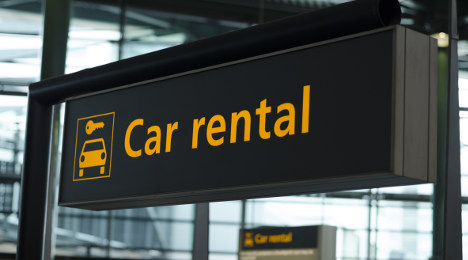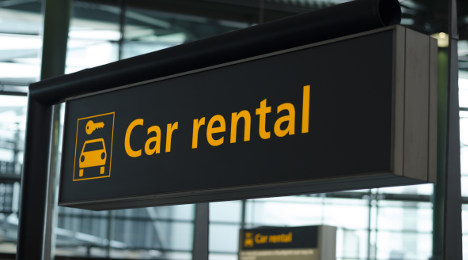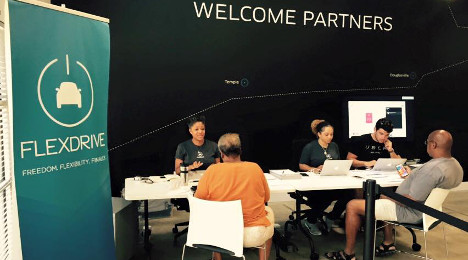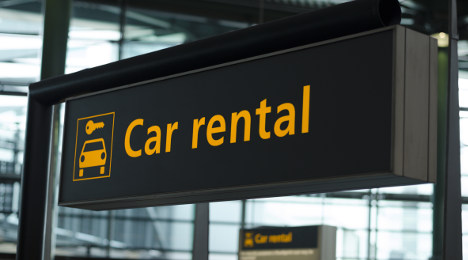The revamp of TrueCar in the used-vehicle market continued on Monday.
Avis Budget Group and TrueCar signed a multi-year partnership agreement in which used-vehicle shoppers can access Avis Budget Group’s inventory of high-quality, well-maintained off-rental vehicles through TrueCar.com.
Officials highlighted that Avis Budget Group offers more than 100 makes and models on TrueCar's website from numerous domestic and foreign manufacturers, including BMW, Chrysler, Ford, General Motors, Hyundai, Nissan, Toyota and Volvo.
The companies emphasized that vehicles are available for purchase at competitive prices, and customers can schedule an “ultimate test drive” to enjoy the full experience of driving the vehicle of their choice. Ultimate test drives are free for two hours or can be as long as three days for a rental fee.
If the customer decides to purchase the vehicle, the base rental fee will be refunded after the purchase is completed.
“TrueCar powers car-buying programs for some of the country's largest membership and service organizations, such as USAA, AARP, American Express, AAA and Sam’s Club, and TrueCar’s platform receives approximately 6 million unique visitors per month,” said Michael Schmidt, senior vice president of fleet services at Avis Budget Group.
“This new partnership exposes our inventory to a much wider audience and serves as a catalyst for vehicle sales growth,” Schmidt continued. “We’re thrilled to work with TrueCar and continue to drive efficiency throughout our organization as we dispose of vehicles through this new channel.”
The move is the latest one by TrueCar chief executive officer and president Chip Perry to revamp how the company operates, a process that began in late March with the former Autotrader boss pledging to address dealer concerns.
“We’re delighted to have this opportunity to work with Avis Budget Group as it will provide consumers a greater selection of high-quality used vehicles,” Perry said. “Demand for pre-owned vehicles is expanding and becoming a larger part of TrueCar’s business.”
TrueCar is slated to be a part of the CPO Forum, the segment of Used Car Week dedicated to highlighting the latest data and trends associated with certified pre-owned vehicles.
Avis Budget Group also is gearing up to be a part of Used Car Week, chiming in during the National Remarketing Conference. Avis Budget Group reiterated that the TrueCar partnership builds upon its vehicle-disposition program for consumers.
Avis Budget Group’s consumer vehicles sales program features a wide selection of late-model Avis and Budget rental vehicles for purchase at competitive prices. Customers can shop online at www.avis.com or www.budget.com and schedule their test drive.
The program is available in:
—Arizona
—California
—Colorado
—Florida
—Georgia
—Illinois
—Kentucky
—Maryland
—Massachusetts
—Michigan
—Minnesota
—Missouri
—New Jersey
—North Carolina
—Ohio
—Oklahoma
—Oregon
—South Carolina
—Tennessee
—Texas
—Utah
—Virginia
—Washington
Dealerships and auctions now aren’t the only businesses that must keep close watches for recalled vehicles.
The U.S. Department of Transportation’s National Highway Traffic Safety Administration announced that beginning on Wednesday rental car agencies must fix any and all open safety defects before renting out vehicles to customers.
The regulator explained Secretary of Transportation Anthony Foxx and NHTSA administrator Mark Rosekind have long advocated for safe rental cars free of open recalls, and the new legislation requiring it was recently passed by Congress in the Fixing America’s Surface Transportation (FAST) Act of 2015.
“When a family picks up a rental car on vacation, they should be able to expect it is free of any known safety defect,” Foxx said. “I thank Congress and the safety advocates who helped turn this common-sense idea into law.”
Federal law now prohibits any company or dealer with fleets greater than 35 vehicles to rent unrepaired recalled vehicles. The rule also extends NHTSA’s recall authority to cover rental car companies for the first time, giving the safety agency power to investigate and punish violators.
The legislation was championed by the family of Raechel and Jacqueline Houck, sisters who died in a rental vehicle that was under a safety recall but had not been repaired.
“This law gives NHTSA one more tool to protect the safety of U.S. motorists,” Rosekind said. “It’s critical that every recalled vehicle, whether new, used, rented or leased, is repaired as soon as possible. Rental agencies operate some of the largest fleets, so this law will go a long way in ensuring the cars and trucks on the road are safe.”
In 2014, the regulator said there were close to 900 recalls affecting 51 million vehicles nationwide. NHTSA has stated it will seek 100 percent remedy completion rates in open recalls.
Last month showed some price softening in off-rental wholesale cars, according to the latest Manheim Used Vehicle Value Index analysis, which said that not since 2013 has the straight average of rental-risk auction prices been this low in February.
Even with rental-risk units having 11.5 percent less mileage on them, prices still fell 4.1 percent year-over-year in February, Cox Automotive chief economist Tom Webb said in the report.
He also pointed out that Manheim’s rental-specific index, which is adjusted for “broad” mix and mileage changes, dropped 5.5 percent.
From a volume standpoint, you can expect more to flow into auctions, Webb said, pointing out a near 13-percent rise in year-to-date sales into rental fleets.
“Given indications that rental car companies are over-fleeted, we expect this pace of deliveries to slow in the coming months and for the number of units entering the wholesale market to rise,” Webb said.
Off-rental volumes
Along those same lines, in the 2016 Used Car Market Report, Webb acknowledges the “justifiable concern” that off-rental pricing will be hurt by the surge in off-lease cars. But he also points out that OEM incentive and inventory practices will play a bigger role in the fate of off-rental prices — which is typically the case, he said.
“On that front, manufacturers, of late, have been better at equating production with demand. But the real test will come in future years when the pace of new-vehicle sales levels off. Most rental car companies are expecting — and planning for — a higher per-vehicle monthly depreciation cost in 2016, but nothing like 2008 and 2009,” Webb said in that report.
Going back to volumes, the Used Car Market Report projects the off-rental wholesale volume should hover in the 1.8 million-unit range for next few years, which compares to 1.66 million off-rental cars in 2015.
“The future growth in off-rental volumes should mirror the growth in the total rental fleet size, as we foresee no significant change in holding periods,” Webb said.
Consolidated Asset Recovery Systems’ fourth appearance on the Triangle Business Journal’s annual Fast 50 list is also its first time coming in at No. 1, representing the top of the top of the fastest-growing private companies in the Raleigh-Durham area.
The company was founded by two software supply chain experts, Steven Norwood and Terry Groves, in 2005.
“We have a long history of growth and profitability,” Norwood said. “Our financial stability in the industry makes us the partner of choice for many service providers such as repossession, skip trace, door knock and auction agents. We are extremely grateful to our employees, customers and partners for helping make us the number one company on this year’s TBJ Fast 50 list.”
The Triangle Business Journal selects and ranks its Fast 50 winners annually based on a formula that counts revenue growth and profitability in the preceding three years – in this case, 2012 through 2014. The results and rankings were analyzed and verified by PwC, an accounting firm.
To find out more about CARS, visit its site here.
For consignors, there is certainly some strategy involved when it comes to balancing which cars are sent to physical auctions or sold online, which ones are offered directly to dealers, and so forth.
We asked John Mathiowetz — an honoree in our inaugural Remarketing and Used-Car Industry's 40 Under 40 and the manager of regional car sales for the Western U.S. at Avis Budget Group — about those key strategies for his company.
“We use a balanced mix of auctions, online and direct-to-dealer strategies. We believe the digital process has room to grow, and we'll always use a variety of channels to remarket our fleet,” he said.
In fact, the various platforms to remarket vehicles can actually be mutually beneficial.
“Our multiple-platform process is gaining traction. The digital marketplace is growing at the auctions as well. They complement each other,” Mathiowetz said.
Meanwhile, when asked for some of the top trends this year in the rental car market impacting his company's remarketing strategy, Mathiowetz said: “Dealer adaptation of the online channels has helped our overall performance. We will continue to find efficiencies in all our processes to keep us moving forward.”
Editor's Note: This is one of several spotlight features included in Auto Remarketing's inaugural 40 Under 40. Stay tuned for more.
The co-founder and general manager of one of Cox Automotive’s newest enterprises — Flexdrive — emphasized during a phone conversation with Auto Remarketing on Tuesday that ramping up its rental fleet numbers and relationship with Uber — the online transportation service provider that’s grown in popularity in some of the largest U.S. metro areas — isn’t eventually going to result in another retail competitor against dealers.
Jose Puente explained that Flexdrive’s involvement with Uber is mostly geared to remove a “friction point for Uber’s growth.” That point comes when drivers are interested in becoming part of the Uber network of providers but would rather not commit to a new-vehicle purchase if they don’t already possess a model that qualifies within Uber’s program.
Uber explained in a report Auto Remarketing posted last week that some drivers want to rent a vehicle when and where they’d like to drive, instead of leasing or buying one. As a result, Uber is working with Flexdrive to pilot a weekly rental option in Atlanta, Dallas, and Nashville, Tenn.
Puente also mentioned the pilot program is expanding into Austin, Texas, beginning on Sept. 3.
Flexdrive already has about 1,000 units in its fleet associated with the Uber program with plans to add “considerably more for 2016,” depending the demand from the transportation provider.
The current plan is for that cluster of vehicles to be in the Uber fleet for about 30 months or 100,000 miles, whichever point arrives first. And Puente indicated that those vehicles would end up in the wholesale market, not through a retail endeavor some rental companies employ.
“We’ve got a variety of options. Our intention is never to retail any cars directly to consumers,” Puente said. “We’re not going to create a new type of car dealership model.
“What we’re looking at is monetizing the use of the car over a period of time and then disposing of that car through the auction to dealers who might be interested in our cars,” he continued.
For dealers not typically interested in vehicles with six figures on the odometer, they might change their mind because of how Flexdrive intends to maintain these units.
A consumer’s relationship with Flexdrive includes vehicle maintenance, roadside assistance and insurance. The company intends to contact the driver every 90 days or 6,000 miles. At that point, the consumer either swaps vehicles or takes the unit in for service at an authorized center where a 190-point inspection and other maintenance tasks are to be completed.
“Effectively what happens as you’re driving the car, we’re monitoring what’s going on with the car,” Puente said.
“The consumer doesn’t have to do anything other than put gas in it and keep it clean,” he added.
Flexdrive’s terms of use includes a breakdown of fees if the vehicle need special attention such as being cleaned of smoke or pet remnants.
“Drive as if it was your own car,” Flexdrive said on its website. “While Flexdrive maintains insurance on all fleet cars available in carriers, through the services, you will be responsible for all uncovered damages, costs, and deductibles resulting from your use of the fleet car, and for all damages that result from a breach of these terms of use or your membership agreement.”
Currently a wide array of popular models already are in Flexdrive’s fleet, including:
— Hyundai Accent, Elantra and Sonata
— Nissan Versa, Sentra, Altima and Pathfinder
— Toyota Corolla, Camry and Highlander
— Chevrolet Cruze
Puente noted that hybrid vehicles are in the fleet, too, but not all-electric models because of their charge limitations that might hinder Uber drivers. He also mentioned that Flextime isn’t involved with Uber’s business that includes limousines or other commercial vehicles.
“We have people who are driving full time, meaning they’re driving over 40 hours a week,” Puente said. “We have people who are driving less than that. A lot of people are driving just enough to cover their car payment.”
Puente added that Flexdrive’s program with Uber officially launched back in May, but the relationship between the two companies started more than a year earlier.
“We started the idea of Flexdrive based on the micro-trends going on in the marketplace based on car-sharing and ride-sharing trends and the needs of people to have alternatives to ownership,” Puente said.
“In the process of putting it together, and arranging our pilot program, we started talking with a lot of people in the industry, car-sharing companies to see what their experiences have been,” he continued. “Through that, we ended up meeting with Uber. They expressed some of the challenges they had with respect to getting people signed up not have the proper car to drive on Uber.
“It wasn’t planned. We just kind of crossed paths at about the same time,” Puente went on to say.
Cox Automotive and Westlake Financial Services are among the companies involved in overhauled and pilot programs to provide vehicles for Uber, the online transportation service provider that’s grown in popularity in some of the largest U.S. metro areas.
Uber explained this week that its revamped leasing program for its network of drivers dubbed Xchange Leasing is an option administered by a subsidiary and designed to fit with the flexibility that drivers value most.
Officials called the Xchange lease “one of a kind,” and offers value they believe traditional vehicle lease terms do not provide.
Unlike most multi-year leases that have high fees for early termination, Uber indicated drivers who participate in Xchange for at least 30 days will be able to return the vehicle with only two weeks’ notice and “limited” additional costs.
The company added its program allows for unlimited mileage and the option to lease a used vehicle, with routine maintenance also included.
“These features combine to create a product unlike anything on the market today,” Andrew Chapin, head of vehicle solutions for Uber, said in a blog post on the company’s website announcing the program.
Chapin indicated Uber first launched a vehicle solutions program 18 months ago in response to feedback from prospective driver-partners who wanted to join the Uber platform but didn’t have access to a qualifying uberX car. Since then, Chapin highlighted nearly 20,000 drivers have participated in the program and collectively taken earned more than $200 million driving with Uber.
“We’ve learned a lot –– about when and where people drive, details about their vehicle needs, and how we can connect partners with options that work best for them,” Chapin said.
“There is a lot of variability in how drivers use Uber, from the reasons they drive to the amount of time they spend on the platform. But one thing is clear: the key to flexible earnings is flexible financing,” he continued.
Xchange Leasing is currently operating in major metropolitan areas in California — Los Angeles, San Francisco, and San Diego — and select cities in Georgia and Maryland. We look forward to piloting the program in additional locations soon.
Uber highlighted Xchange Leasing complements additional options currently available within Uber’s Vehicle Solutions program, including:
— Discounts from automakers: Uber indicated it has expanded partnerships with OEMs to facilitate new-vehicle purchases. Participating automakers include: Toyota, General Motors, Ford, Hyundai, Nissan, Volkswagen and Chrysler. To date, participating Uber driver-partners have saved more than $7 million through these OEM discounts.
—Streamlined financing partnerships: Drivers looking for a vehicle have access to financing available through Westlake Financial Services, which offers traditional auto financing to U.S. drivers across the credit spectrum, and BAMA Leasing, which offers leases to drivers in Boston and San Francisco.
“We were introduced to the Uber team through one of our banking relationships. They recognized our adaptability and saw a fit with the new ways Uber was getting cars to its drivers,” said Casey Harmon, senior vice president of corporate development for Westlake Financial Services.
“Westlake is a full-spectrum lender, so we work with everyone,” Harmon continued. “We have no minimum FICO or income levels. We also work with all job and residence times, and we can work any credit mishaps that Uber drivers might have had.”
— Rental pilot: Uber added that some drivers want to rent a vehicle when and where they’d like to drive, instead of leasing or buying one. As a result, Uber is working with Flexdrive, a Cox Automotive company, to pilot a weekly rental option in Atlanta, Dallas, and Nashville, Tenn.
Drivers can rent an uberX-eligible vehicle on a weekly basis, with insurance and maintenance included.
“We hope to make rental options available in more cities in the future,” Chapin said.
“We’re excited about how these new solutions meet drivers’ unique needs, and offer more and better choices and greater flexibility than ever before,” he went on to say.
If you’re having trouble finding a low-mileage unit in the off-rental lanes, don’t be alarmed.
Manheim discovered the average mileage for these units reached a new high earlier this year, surpassing 50,000 miles for the first time. That amount is more than double the low points Manheim spotted. The industry saw average of about 25,000 miles for these off-rental units first in mid-2003 and again in early 2007.
As a result, Manheim indicated a straight average of auction prices for rental risk units declined 14.2 percent between March and June. After adjusting for what Cox Automotive chief economist Tom Webb called “broad shifts” in market class and mileage, the decline was “more modest, but still significant” at 6.5 percent.
In his quarterly conference call, Webb explained much of the weakness was the result of older and rougher-condition vehicles being sold.
For example in the second quarter of last year, 62 percent of the rental risk units sold were from one model year past, and 23 percent were from two model years past. But in the second quarter of this year, only 31 percent of sales were from one model year past, and 55 percent were from two model years past.
Likewise, in the second quarter of 2014, 45 percent of the risk units sold at auction had a condition grade of 4.0 or better. In the second quarter of this year, only 30 percent did.
Despite the lower vehicle quality, Webb insisted dealers are “very interested” in off-rental units even, though “they’re not retail ready.”
“The majority of the rental-risk units are bought by the independent dealers, so they’re not uncomfortable with the mileage range,” Webb said. “They certainly like that it’s a later-model unit in terms of model-year designation.
“Many dealers will no doubt like the near $2,000 reduction in the average auction price for a rental risk over the past two months, as it will allow them to greatly expand the customer base that they can get into a late-model used vehicle,” he continued.
“But, of course, dealers will be successful only if they can complete the additional reconditioning work quickly and cost-effectively,” Webb went on to say.
“Unless that dealer has the capability, that savings is not as big as it appears,” he added.
Manheim also noticed auction volumes for rental risk units were up significantly in June and for the first half of the year. Meanwhile, Webb mentioned the number of new units sold into rental declined 6 percent in June (due to a significant reduction in General Motors deliveries), but were up 6.5 percent year-to-date.
Cox Automotive chief economist Tom Webb is confident the used-vehicle industry will eventually surpass the all-time sales record sometime in the coming years; a feat that would require eclipsing the mark of 44.14 million units CNW Research indicated was established 10 years ago.
But a return of double-digit margins for dealers on those used-vehicle turns? Webb isn’t sure the rare heyday of margins above 11.5 percent seen back in 2009 will ever be enjoyed again.
Webb attributed part of the reason why used sales should top the all-time record is growing volumes of off-lease vehicles, which is already fueling the certified pre-owned market to sterling figures.
The latest data from the National Automobile Dealers Association shows 4.4 million used vehicles turned in June, pushing the total at the halfway point of 2015 to close to 18.6 million used sales.
While the pace would have to intensify during the second of this year to approach the record set in 2005, Webb indicated during his recent quarterly conference call that the majority of factors influencing used sales such as financing and inventory availability “are becoming better.”
The growing sales volume is helping dealerships enjoy record profits for the used operations. That’s despite margins rebounding only slightly this past quarter after bottoming out during the second half of 2014, according to Webb’s tracking of the seven publicly traded dealer groups that he says provides a barometer for how the entire industry is performing.
Going back eight years, Webb pegged the margin high at above 11.5 percent during the worst of the recession in late 2008 and early 2009. Since that time, margins for these dealer groups have drifted lower, settling at just about 9.5 percent this past quarter.
Webb cautioned that the margin peak “was very much an anomaly related to the recession and the supply of units, the volume of units being sold and holding out for gross.”
He continued with, “Rather being overly concerned about the margin compression, I would point out that when a competitive industry like auto retailing achieves greater efficiencies, and they certainly have, some of those savings are passed on to the consumer in the form of lower margins.
“But as the growth in throughput stalls and those further efficiencies seem harder and harder to achieve, it is important that we in the industry continue to look at where the pain points are and develop solutions to relieve them,” Webb added.
Webb also mentioned that while his dealer group margin data only goes back eight years, he insisted that if he had information “going back decades and decades,” the margin metric would show a long-term downward trend.
“It’s something we just have in the industry. Margins go down; they don’t really come back up,” Webb said.
“But again, that’s doable because you have great efficiencies, greater throughput overall,” he continued. “You’re still getting great F&I income. At these margins, you’re still making record profits. I would say we start might start to bottom out in terms of overall margins and they only go down further to the extent that the industry achieves even great efficiencies.”
Enterprise Holdings plans to expand its offerings via two acquisitions it announced today.
Operating primarily in the Brooklyn borough of New York, AllCar Rent-a-Car and the car-sharing service Carpingo, brands formerly owned by Citiwide Auto Leasing Inc., will be added to the Enterprise portfolio.
Gil Cygler, Citiwide’s president, says he was drawn by Enterprise’s similar business foundation.
“As a family-owned company, we sought a business partner that shared our values,” Cygler said. “We respect Enterprise’s commitment to customer service and enhancing the communities in which it operates. I know our customers will be in good hands.”
AllCar, a neighborhood car rental provider, was founded in 1979 by Cygler’s father, Samuel, when he began renting cars to customers who needed a temporary vehicle while their own was being repaired at his service station. Cygler helped develop the AllCar brand after college in both New York and nationwide.
Cygler also sits on the board of directors of the American Car Rental Association.
According to the release, terms of the transaction were not disclosed. As part of the acquisition, all eight AllCar Brooklyn branch offices will discontinue operations and customers will be served by nearby Enterprise Rent-A-Car locations.
Carpingo members will transition to the Enterprise CarShare program during the summer and will be granted access to Enterprise car-sharing services in Brooklyn, Manhattan, Queens, the Bronx and parts of New Jersey.











